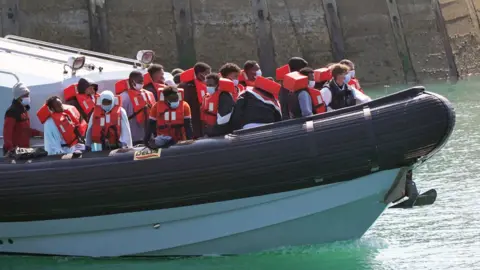Channel crossings: Priti Patel to meet French minister over migrants
 PA Media
PA MediaThe home secretary is expected to hold talks with her French counterpart about the number of migrants crossing the English Channel to the UK.
Priti Patel and Interior Minister Gérald Darmanin are both due to attend a meeting of G7 ministers in London.
She has warned that Britain could withhold £54.2m it had promised to pay France to help deal with the problem, unless more boats are intercepted.
The Home Office said 785 people crossed the channel in small boats on Monday.
More than 12,600 people have made the dangerous journey so far this year.
The rise in the number of migrants making the crossing in recent days comes after several weeks of unsettled weather.
Patrols stepped up
Back in July the UK agreed to pay France to step up patrols along the French coast in order to deter crossings.
On Tuesday, the prime minister's official spokesman said UK and French officials were "working on the implementation" of the deal and that "significant" funding provided in November had already led to increased patrols and "enhanced intelligence".
He said that following a period of poor weather there had been an increase in crossings but warned that the journey remained "extremely dangerous".
"We remain determined to fix the broken asylum system and break the business model of people smugglers who put lives at risk, and welcome people through safe and legal routes," he added.
And speaking during Prime Minister's Questions in the House of Commons, Mr Johnson said efforts to stop the illegal crossings of the English Channel depended "to a large extent" on the ability of the French authorities.
He was responding to a question from the Conservative MP, Lee Anderson, who urged ministers to "take some direct action and send the boats straight back" because "thousands and thousands of illegal immigrants" are landing on Kent's shores every month.
The PM said it was a "perennial problem" and the home secretary was "dealing with it in the best possible way, which is to make sure that they don't leave those French shores".
He added: "Clearly, as time goes on and this problem continues, we are going to have to make sure that we use every possible tactic at our disposal to stop what I think is a vile trade and a manipulation of people's hopes."
Impossible to police
But speaking earlier on Radio 4's Today programme, Calais MP Pierre-Henri Dumont, said "nothing" can stop migrants crossing the Channel and it is "impossible" for French police to patrol the whole shoreline.
"The fact is, we've got 300 to 400 kilometres of shore to monitor every day and every night and it's quite impossible to have police officers every 100 metres because of the length of the shore" he said.
There are "numerous causes" why people attempt the journey in the first place, including the warmer weather, migrants being more likely to speak English and the perception that it is easier to find work in the UK, he said.
He added: "We have more and more patrols.
"The money that was promised to be given by the UK government to France is set to maintain this number of patrols that we already doubled a few weeks ago."
Ahead of the meeting, Amnesty International UK's refugee and migrant rights director, Steve Valdez-Symonds, said without a change of policy by the government, the talks were a "lost cause".
"The home secretary can keep on spending public money, but nothing is going to change unless she is prepared to change her failed and unworkable policies" he said.
"People have every right to seek asylum in the UK," he said, adding "they only make dangerous journeys and rely on smugglers because there are no safe alternatives made available to them".
Labour's shadow home secretary Nick Thomas-Symonds called for the government to focus on finding a "workable solution with the French authorities, tackling vile people-smuggling gangs and properly managing safe routes to prevent people risking their lives".

What happens to migrants in the English Channel?
- If migrants are found in UK national waters, it is likely they will be brought to a British port
- If they are in international waters, the UK will work with French authorities to decide where to take them
- Each country has search-and-rescue zones
- An EU law called Dublin III allows asylum seekers to be transferred back to the first member state they were proven to have entered but the UK is no longer part of this arrangement and has not agreed a new scheme to replace it
- The £54.2m deal doubles the number of police patrolling France's beaches, funds improved intelligence sharing and introduces better technology to target the gangs who organise the crossings
- It follows a £28.2m deal last November that failed to limit crossings


- THE GREATEST PHARAOH: Who was Ramesses The Great and why was he beloved?
- IS CHOCOLATE GOOD FOR YOU?: Why eating a small amount of dark chocolate can be healthy

